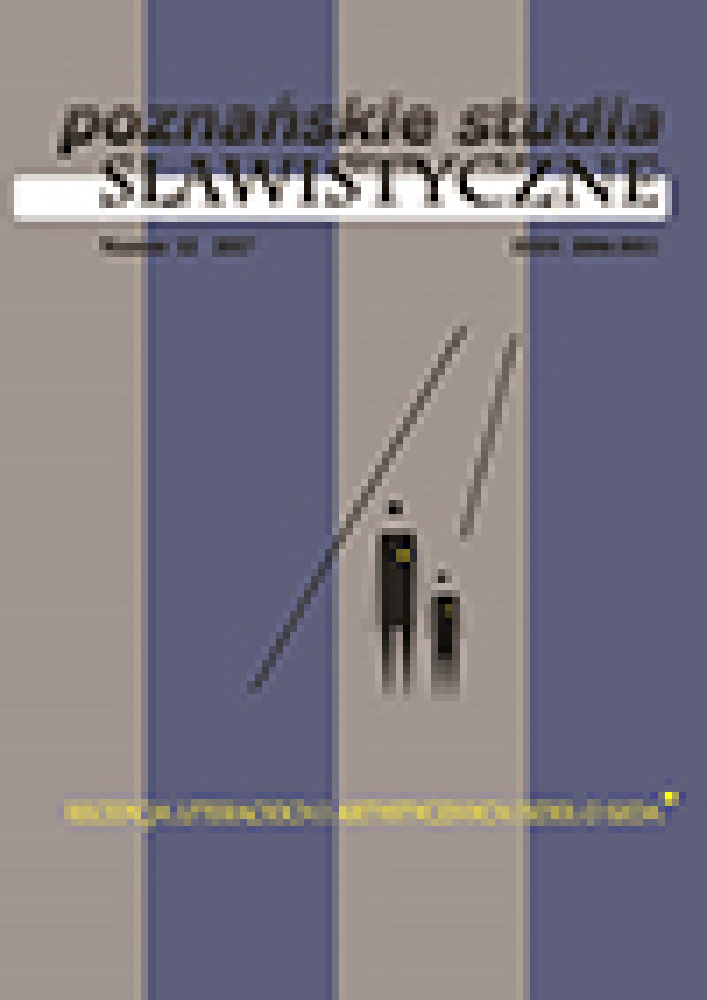Abstract
In the essay, I make an attempt to present several ways, in which the Western canon of literature, music, and cinema has influenced Noc Walpurgi. With regard to this, Marcin Bortkiewicz’s film turns out to be a work made of many citations, in Walter Benjamin’s terms, drawn extensively on Goethe’s Faust, Mann’s The Magic Mountain, Bulgakov’s The Master and Margarita, Wagner’s Ride of the Valkyries, and Puccini’s Turandot, and the film noir poetics elaborated in the 40s and 50s of the twentieth century. Based on Magdalena Gauer’s monodrama Diva, Noc Walpurgi illuminates in the highly expressionist manner an alienated, cynical, and despotic psyche of Nora Sadler, a great opera singer, who is tormented by the Holocaust past.References
Arendt H., 1965, Eichmann in Jerusalem. A Report on the Banality of Evil, New York.
Arendt H., 1968, Men in Dark Times, New York.
Benjamin W., 1999, Illuminations, introduction H. Arendt, trans. H. Zorn, London.
Berman M., 1988, All That Is Solid Melts Into Air. The Experience of Modernity, New York–London.
Bloom H., 2003, A Map of Misreading, with a new preface, Oxford–New York.
Bulgakov M., 1992, The Master and Margarita, trans. D. Burgin and K. Tiernan O’Connor, New York.
Burzyńska A., Markowski M.P., 2007, Teorie literatury XX wieku. Podręcznik, Kraków.
Ciechowski Z., 2016, Dostałam rolę wymarzoną. Z M. Zajączkowską rozmawia Z. Ciechowski, 17.06., 20.10.2016.
Cleary S., 2008, Spaso House, 75 years: A Short History, Swindon.
Cooper J.M., 2007, Mendelssohn, Goethe, and the Walpurgis Night: The Heathen Muse in European Culture, 1700–1850, Rochester.
Christopher N., 1998, Somewhere in the Night: Film Noir and the American City, New York.
Derrida J., 1996, The Archive Fever: A Freudian Impression, trans. E. Prenowitz, Chicago–London.
Elon A., 2006, Introduction, in: H. Arendt, Eichmann in Jerusalem…, New York.
https://doi.org/10.1007/0-387-28256-4_1
Emerson R.W., 1960, The Conduct of Life, Boston.
Goethe J.W., 2003, Faust, Part I & Part II, trans. A.S. Kline, 8.03.2016.
Knowles E. (ed.), 2006, Oxford Dictionary of Phrase and Fable, 2nd ed., 10.12.2015.
Łaguna P., 1984, Ironia jako wyraz i jako postawa, Kraków.
Mann T., 1996, The Magic Mountain, trans. J.E. Woods, New York.
Marciniak I., 2011, Z Kołobrzegu na Broadway. Rozmowa z Magdaleną Gauer, „Głos Koszaliński” No. 303, 30.12., , 10.12.2015.
Naremore J., 2008, More than Night: Film Noir in Its Contexts, Berkeley–Los Angeles–London.
Noc Walpurgi, 2015, directed Robert Bortkiewicz, script Magdalena Gauer, Robert Bortkiewicz, photography Andrzej Wojciechowski, music Marek Czerniewicz, Polski Instytut Sztuki Filmowej, PS Film, Aurora Films.
Ottoson R., 1981, A Reference Guide to the American Film Noir: 1940–1958, Metuchen–New York–London.
Power S., 2013, “A Problem From Hell”: America and the Age of Genocide, New York.
Ryćkowska M., 2015, Lubimy być bezkarni. O wspólnej pracy i najtrudniejszych momentach na planie filmu Noc Walpurgi M. Zajączkowska i M. Bortkiewicz rozmawiają z M. Ryćkowską, 17.09., 15.12.2015.
Silver A., Ward E., 1992, Film Noir: An Encyclopedic Reference to the American Style, 3rd ed., Woodstock–New York.
Spivak G.C., 1996, Translator’s Preface, in: J. Derrida, Of Grammatology, corrected edition, trans. G.C. Spivak, Baltimore-London.
Steciak M., 2015, Czekam na niespodzianki. Z M. Zajączkowską rozmawia M. Steciak, 07.08., 15.12.2015.
Sukces na Broadwayu, “Głos Koszaliński” No. 275, 28.11.2011.
Timms E., 1989, Karl Kraus: Apocalyptic Satirist: Culture and Catastrophe in Habsburg Vienna (1874–1918), New Haven–London.
Timms E., 2005, Karl Kraus: Apocalyptic Satirist: The Post-War Crisis and the Rise of the Swastika (1918–1936), New Haven–London.
Weaver W., Puccini S., (eds), 1994, The Puccini Companion, New York.
Zohn H., 1997, Karl Kraus and the Critics, Columbia.
License
Copyright (c) 2017 Anna Maria Skibska

This work is licensed under a Creative Commons Attribution-NoDerivatives 4.0 International License.
